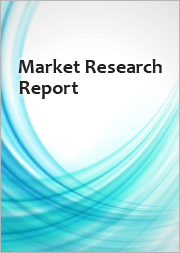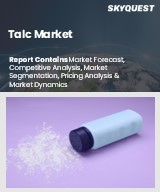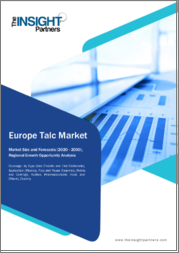
|
시장보고서
상품코드
1510777
유럽의 탈크 시장 : 지역별 분석 - 침전물 유형별, 최종 이용 산업별 예측(2030년)Europe Talc Market Forecast to 2030 - Regional Analysis - by Deposit Type (Talc Chlorite and Talc Carbonate) and End-Use Industry (Plastics, Pulp & Paper, Ceramics, Paints & Coatings, Rubber, Pharmaceuticals, Food, and Others) |
||||||
유럽의 탈크 시장은 2022년 4억 1122만 달러에서 2030년 6억 274만 달러로 성장할 것으로 예상됩니다. 예측기간 동안 복합 연간 성장률(CAGR)은 4.9%로 추정됩니다.
세라믹 산업의 성장이 유럽의 탈크 시장을 견인
탈크는 유리화 공정의 개선을 돕기 위해 모든 유형의 세라믹의 핵심 첨가제입니다. 또한, 소성 온도의 저하나 소성 사이클의 단축에도 도움이 됩니다. 탈크는 고온 내성을 가지므로 세라믹의 내열 충격성을 향상시키고 파괴를 줄입니다. 또한 스마트폰, 태블릿 등 일상적으로 사용되는 전자기기에 대한 수요 증가는 2026년까지 세계 전자기기용 세라믹 시장 규모를 약 160억 달러로 밀어올릴 것으로 예상됩니다. 세라믹은 열전도성이 높고 내약품 침식성이 있기 때문에 집적회로나 마이크로칩의 「패키지」에 자주 사용됩니다. 유럽의에서는 세라믹 부문이 가장 강력한 산업 부문 중 하나입니다. 이탈리아, 독일, 스페인, 프랑스, 영국, 포르투갈, 오스트리아는 세라믹 제조업이 활발한 유럽의 주요 국가 중 하나입니다. 이 나라들은 세계 여러 나라에 제품을 수출하고 있습니다. 따라서 성장하는 세라믹 산업은 탈크 사용을 촉진하고 예측 기간 동안 탈크 시장에 유리한 기회를 제공할 것으로 예상됩니다.
유럽의 탈크 시장 개요
독일, 프랑스, 이탈리아, 영국, 러시아는 유럽의 탈크 시장의 주요 국가입니다. IMA - Europe aisbl에 따르면 유럽의 탈크 생산량은 생활 수준, 1인당 소득, 기술 상승에 따라 증가하고 있습니다. 이 지역의 경제 발전은 급속한 도시화로 이어지고 있습니다. 이 지역의 탈크 시장은 자동차, 건설, 페인트 및 코팅, 세라믹, 펄프,제지 산업이 견인하고 있습니다. 이러한 성장은 건설 산업에 대한 투자 증가와 다른 산업의 인프라 정비로 인한 것입니다. FIEC(유럽의건설산업연맹)에 따르면 사무실, 병원, 호텔, 학교, 산업용 빌딩 등 비주택 건설 투자는 2020년에 비해 2021년 2.6% 증가했습니다.
또한 국제자동차공업회(OICA)에 따르면 유럽의연합의 2021년 총 자동차 생산량은 1,309만대였습니다. 탈크는 일반적으로 자동차 생산에 사용되는 다수의 중합체 매트릭스를 개질하는데 사용됩니다. 자동차 시장의 확대는 탈크 수요를 촉진하고 있습니다.
유럽의 탈크 시장 수익과 예측(-2030년)(금액)
유럽의 탈크 시장 세분화
유럽의 탈크 시장은 유형, 용도, 국가로 구분됩니다.
유형별로 유럽의 탈크 시장은 탈크 클로라이트와 탈크 카보네이트로 이분됩니다. 2022년 유럽의 탈크 시장에서는 탄산 탈크 부문이 큰 점유율을 차지하고 있습니다.
용도별로 유럽의 탈크 시장은 플라스틱, 펄프, 제지, 세라믹, 페인트, 코팅, 고무, 의약품, 식품 등으로 구분됩니다. 2022년 유럽의 탈크 시장에서는 펄프 및 제지 분야가 가장 큰 점유율을 차지하고 있습니다.
국가별로 유럽의 탈크 시장은 독일, 프랑스, 이탈리아, 영국, 러시아 및 기타 유럽의으로 구분됩니다. 기타 유럽의이 2022년 유럽의 탈크 시장을 독점했습니다.
Elementis Plc, Golcha Minerals Pvt Ltd, Imerys SA, IMI Fabi SpA, Liaoning Aihai Talc Co Ltd, Minerals Technologies Inc. .
목차
제1장 서론
제2장 주요 요약
- 주요 인사이트
- 시장의 매력
제3장 조사 방법
- 조사 범위
- 2차 조사
- 1차 조사
제4장 유럽의 탈크 시장 상황
- Porter's Five Forces 분석
- 신규 진입업자의 위협
- 공급기업의 협상력
- 구매자의 협상력 : 신규 진입의 위협
- 경쟁 기업간 경쟁 관계
- 대체품의 위협
- 생태계 분석
- 채굴
- 가공과 분쇄
- 제품의 유통 또는 공급
- 최종 이용 산업
제5장 유럽의 탈크 시장 : 주요 시장 역학
- 시장 성장 촉진요인
- 종이 및 펄프 산업에 있어서의 탈크 사용 증가
- 다양한 최종 이용 산업에서의 수요 증가
- 시장 성장 억제요인
- 탈크의 사용에 관한 건강상의 우려
- 시장 기회
- 세라믹 산업의 성장
- 향후의 동향
- 자동차 산업의 플라스틱 수요 증가
- 영향 분석
제6장 탈크 시장 : 유럽의 시장 분석
- 유럽 탈크 시장의 매출액
- 유럽 탈크 시장 수량
- 유럽 탈크 시장 예측,분석
제7장 유럽의 탈크 시장 분석 - 유형
- 탈크 클로라이트
- 탈크 클로라이트 시장 : 수익과 예측(-2030년)
- 탈크 클로라이트 시장 : 수량과 예측(-2030년)
- 탄산 탈크
- 탄산 탈크의 개요
- 탄산 탈크 시장 : 수익과 예측(-2030년)
- 탄산탈크 시장 규모 추이와 예측(-2030년)
제8장 유럽의 탈크 시장 분석 - 용도
- 플라스틱
- 플라스틱 시장 : 수익과 예측(-2030년)
- 펄프 및 종이
- 종이펄프 시장 : 수익과 예측(-2030년)
- 세라믹
- 세라믹 시장 : 수익과 예측(-2030년)
- 페인트
- 도료 시장 : 수익과 예측(-2030년)
- 고무
- 고무 시장 : 수익과 예측(-2030년)
- 의약품
- 의약품 시장 : 수익과 예측(-2030년)
- 식품
- 식품 시장 : 수익과 예측(-2030년)
- 기타
- 기타 시장 : 수익과 예측(-2030년)
제9장 유럽의 탈크 시장 : 국가별 분석
- 유럽
- 독일
- 프랑스
- 이탈리아
- 영국
- 러시아
- 기타 유럽
제10장 업계 정세
- 합병과 인수
- 기타 사업 전략
제11장 기업 프로파일
- Elementis Plc
- Golcha Minerals Pvt Ltd
- Imerys SA
- IMI Fabi SpA
- Liaoning Aihai Talc Co Ltd
- Minerals Technologies Inc
- Nippon Talc Co Ltd
- SCR - Sibelco NV
제12장 부록
BJH 24.07.18The Europe talc market is expected to grow from US$ 411.22 million in 2022 to US$ 602.74 million by 2030. It is estimated to grow at a CAGR of 4.9% from 2022 to 2030.
Growth of Ceramics Industry Drives Europe Talc Market
Talc is a core additive for all types of ceramics as it helps improve the vitrification process. It also assists in reducing firing temperatures and shortening firing cycles. Since talc has a high-temperature resistance, it improves the thermal shock resistance of ceramics and reduces fractures. Further, the growing demand for smartphones, tablets, and other electronic items that are used daily is predicted to propel the size of the worldwide electronics ceramics market to about US$16 billion by 2026. Ceramics have good heat conductivity and chemical erosion resistance, which makes them a popular choice for the "package" of integrated circuits or microchips. In Europe, the ceramic sector is one of the strongest industrial sectors. Italy, Germany, Spain, France, the UK, Portugal, and Austria are among the major countries in Europe with a strong ceramics manufacturing sector. The countries export their products to different countries across the world. Thus, the growing ceramics industry is expected to boost talc usage, which would offer lucrative opportunities for the talc market during the forecast period.
Europe Talc Market Overview
Germany, France, Italy, the UK, and Russia are the main countries in the talc market in Europe. According to the IMA-Europe aisbl, Europe's talc production has increased along with the rise in living standards, per capita income, and technology. Economic development in the region has also led to rapid urbanization. The region's talc market is driven by automotive, construction, paints & coatings, ceramics, and pulp & paper industries. This growth ensues from rising investments in the construction industry and infrastructural developments in other industries. According to the FIEC - European Construction Industry Federation, investment in nonpresidential construction, such as the construction of offices, hospitals, hotels, schools, and industrial buildings, experienced an increase of 2.6% in 2021 compared to 2020.
Furthermore, according to the International Organization of Motor Vehicle Manufacturers (OICA), total vehicle production in European Union was 13.09 million units in 2021. Talc is usually used to modify several polymeric matrices used in automobile production. The expanding automotive market is propelling the demand for talc.
Europe Talc Market Revenue and Forecast to 2030 (US$ Million)
Europe Talc Market Segmentation
The Europe talc market is segmented into type, application, and country.
Based on type, the Europe talc market is bifurcated into talc chlorite and talc carbonate. The talc carbonate segment held a larger share of the Europe talc market in 2022.
In terms of application, the Europe talc market is segmented into plastics, pulp and paper, ceramics, paints and coatings, rubber, pharmaceuticals, food, and others. The pulp and paper segment held the largest share of the Europe talc market in 2022.
By country, the Europe talc market is segmented into Germany, France, Italy, the UK, Russia, and the Rest of Europe. The Rest of Europe dominated the Europe talc market in 2022.
Elementis Plc, Golcha Minerals Pvt Ltd, Imerys SA, IMI Fabi SpA, Liaoning Aihai Talc Co Ltd, Minerals Technologies Inc, Nippon Talc Co Lt, and SCR-Sibelco NV are some of the leading companies operating in the Europe talc market.
Table Of Contents
1. Introduction
- 1.1 The Insight Partners Research Report Guidance
- 1.2 Market Segmentation
2. Executive Summary
- 2.1 Key Insights
- 2.2 Market Attractiveness
3. Research Methodology
- 3.1 Coverage
- 3.2 Secondary Research
- 3.3 Primary Research
4. Europe Talc Market Landscape
- 4.1 Overview
- 4.2 Porter's Five Forces Analysis
- 4.2.1 Threat of New Entrants:
- 4.2.2 Bargaining Power of Suppliers:
- 4.2.3 Bargaining Power of Buyers:
- 4.2.4 Competitive Rivalry:
- 4.2.5 Threat of Substitutes:
- 4.3 Ecosystem Analysis
- 4.3.1 Overview:
- 4.3.2 Mining:
- 4.3.3 Processing and Grinding
- 4.3.4 Product Distribution or Supply
- 4.3.5 End-Use Industries
5. Europe Talc Market - Key Market Dynamics
- 5.1 Market Drivers
- 5.1.1 Growing Use of Talc in Paper & Pulp Industry
- 5.1.2 Increasing Demand from Various End-Use Industries
- 5.2 Market Restraints
- 5.2.1 Health Concerns Related to Usage of Talc
- 5.3 Market Opportunities
- 5.3.1 Growth of Ceramics Industry
- 5.4 Future Trends
- 5.4.1 Growing Demand for Plastics in Automotive Industry
- 5.5 Impact Analysis
6. Talc Market - Europe Market Analysis
- 6.1 Europe Talc Market Revenue (US$ Million)
- 6.2 Europe Talc Market Volume (Kilo tons)
- 6.3 Europe Talc Market Forecast and Analysis
7. Europe Talc Market Analysis - Type
- 7.1 Talc Chlorite
- 7.1.1 Overview
- 7.1.2 Talc Chlorite Market Revenue and Forecast to 2030 (US$ Million)
- 7.1.3 Talc Chlorite Market Volume and Forecast to 2030 (Kilo tons)
- 7.2 Talc Carbonate
- 7.2.1 Overview
- 7.2.2 Talc Carbonate Market Revenue and Forecast to 2030 (US$ Million)
- 7.2.3 Talc Carbonate Market Volume and Forecast to 2030 (Kilo tons)
8. Europe Talc Market Analysis - Application
- 8.1 Plastics
- 8.1.1 Overview
- 8.1.2 Plastics Market Revenue and Forecast to 2030 (US$ Million)
- 8.2 Pulp and Paper
- 8.2.1 Overview
- 8.2.2 Pulp and Paper Market Revenue and Forecast to 2030 (US$ Million)
- 8.3 Ceramics
- 8.3.1 Overview
- 8.3.2 Ceramics Market Revenue and Forecast to 2030 (US$ Million)
- 8.4 Paints and Coatings
- 8.4.1 Overview
- 8.4.2 Paints and Coatings Market Revenue and Forecast to 2030 (US$ Million)
- 8.5 Rubber
- 8.5.1 Overview
- 8.5.2 Rubber Market Revenue and Forecast to 2030 (US$ Million)
- 8.6 Pharmaceuticals
- 8.6.1 Overview
- 8.6.2 Pharmaceuticals Market Revenue and Forecast to 2030 (US$ Million)
- 8.7 Food
- 8.7.1 Overview
- 8.7.2 Food Market Revenue and Forecast to 2030 (US$ Million)
- 8.8 Others
- 8.8.1 Overview
- 8.8.2 Others Market Revenue and Forecast to 2030 (US$ Million)
9. Europe Talc Market - Country Analysis
- 9.1 Europe
- 9.1.1 Europe Talc Market Overview
- 9.1.2 Europe Talc Market, By Key Country - Revenue 2022 (US$ Million)
- 9.1.3 Europe Talc Market Revenue and Forecasts and Analysis - By Countries
- 9.1.3.1 Europe Talc Market Breakdown by Country
- 9.1.3.2 Germany Talc Market Revenue and Forecasts to 2030 (US$ Million)
- 9.1.3.3 Germany Talc Market Volume and Forecasts to 2030 (Kilo tons)
- 9.1.3.3.1 Germany Talc Market Breakdown by Type
- 9.1.3.3.2 Germany Talc Market Breakdown by Application
- 9.1.3.4 France Talc Market Revenue and Forecasts to 2030 (US$ Million)
- 9.1.3.5 France Talc Market Volume and Forecasts to 2030 (Kilo tons)
- 9.1.3.5.1 France Talc Market Breakdown by Type
- 9.1.3.5.2 France Talc Market Breakdown by Application
- 9.1.3.6 Italy Talc Market Revenue and Forecasts to 2030 (US$ Million)
- 9.1.3.7 Italy Talc Market Volume and Forecasts to 2030 (Kilo tons)
- 9.1.3.7.1 Italy Talc Market Breakdown by Type
- 9.1.3.7.2 Italy Talc Market Breakdown by Application
- 9.1.3.8 UK Talc Market Revenue and Forecasts to 2030 (US$ Million)
- 9.1.3.9 UK Talc Market Volume and Forecasts to 2030 (Kilo tons)
- 9.1.3.9.1 UK Talc Market Breakdown by Type
- 9.1.3.9.2 UK Talc Market Breakdown by Application
- 9.1.3.10 Russia Talc Market Revenue and Forecasts to 2030 (US$ Million)
- 9.1.3.11 Russia Talc Market Volume and Forecasts to 2030 (Kilo tons)
- 9.1.3.11.1 Russia Talc Market Breakdown by Type
- 9.1.3.11.2 Russia Talc Market Breakdown by Application
- 9.1.3.12 Rest of Europe Talc Market Revenue and Forecasts to 2030 (US$ Million)
- 9.1.3.13 Rest of Europe Talc Market Volume and Forecasts to 2030 (Kilo tons)
- 9.1.3.13.1 Rest of Europe Talc Market Breakdown by Type
- 9.1.3.13.2 Rest of Europe Talc Market Breakdown by Application
10. Industry Landscape
- 10.1 Overview
- 10.2 Merger and Acquisition
- 10.3 Other Business Strategies
11. Company Profiles
- 11.1 Elementis Plc
- 11.1.1 Key Facts
- 11.1.2 Business Description
- 11.1.3 Products and Services
- 11.1.4 Financial Overview
- 11.1.5 SWOT Analysis
- 11.1.6 Key Developments
- 11.2 Golcha Minerals Pvt Ltd
- 11.2.1 Key Facts
- 11.2.2 Business Description
- 11.2.3 Products and Services
- 11.2.4 Financial Overview
- 11.2.5 SWOT Analysis
- 11.2.6 Key Developments
- 11.3 Imerys SA
- 11.3.1 Key Facts
- 11.3.2 Business Description
- 11.3.3 Products and Services
- 11.3.4 Financial Overview
- 11.3.5 SWOT Analysis
- 11.3.6 Key Developments
- 11.4 IMI Fabi SpA
- 11.4.1 Key Facts
- 11.4.2 Business Description
- 11.4.3 Products and Services
- 11.4.4 Financial Overview
- 11.4.5 SWOT Analysis
- 11.4.6 Key Developments
- 11.5 Liaoning Aihai Talc Co Ltd
- 11.5.1 Key Facts
- 11.5.2 Business Description
- 11.5.3 Products and Services
- 11.5.4 Financial Overview
- 11.5.5 SWOT Analysis
- 11.5.6 Key Developments
- 11.6 Minerals Technologies Inc
- 11.6.1 Key Facts
- 11.6.2 Business Description
- 11.6.3 Products and Services
- 11.6.4 Financial Overview
- 11.6.5 SWOT Analysis
- 11.6.6 Key Developments
- 11.7 Nippon Talc Co Ltd
- 11.7.1 Key Facts
- 11.7.2 Business Description
- 11.7.3 Products and Services
- 11.7.4 Financial Overview
- 11.7.5 SWOT Analysis
- 11.7.6 Key Developments
- 11.8 SCR-Sibelco NV
- 11.8.1 Key Facts
- 11.8.2 Business Description
- 11.8.3 Products and Services
- 11.8.4 Financial Overview
- 11.8.5 SWOT Analysis
- 11.8.6 Key Developments






